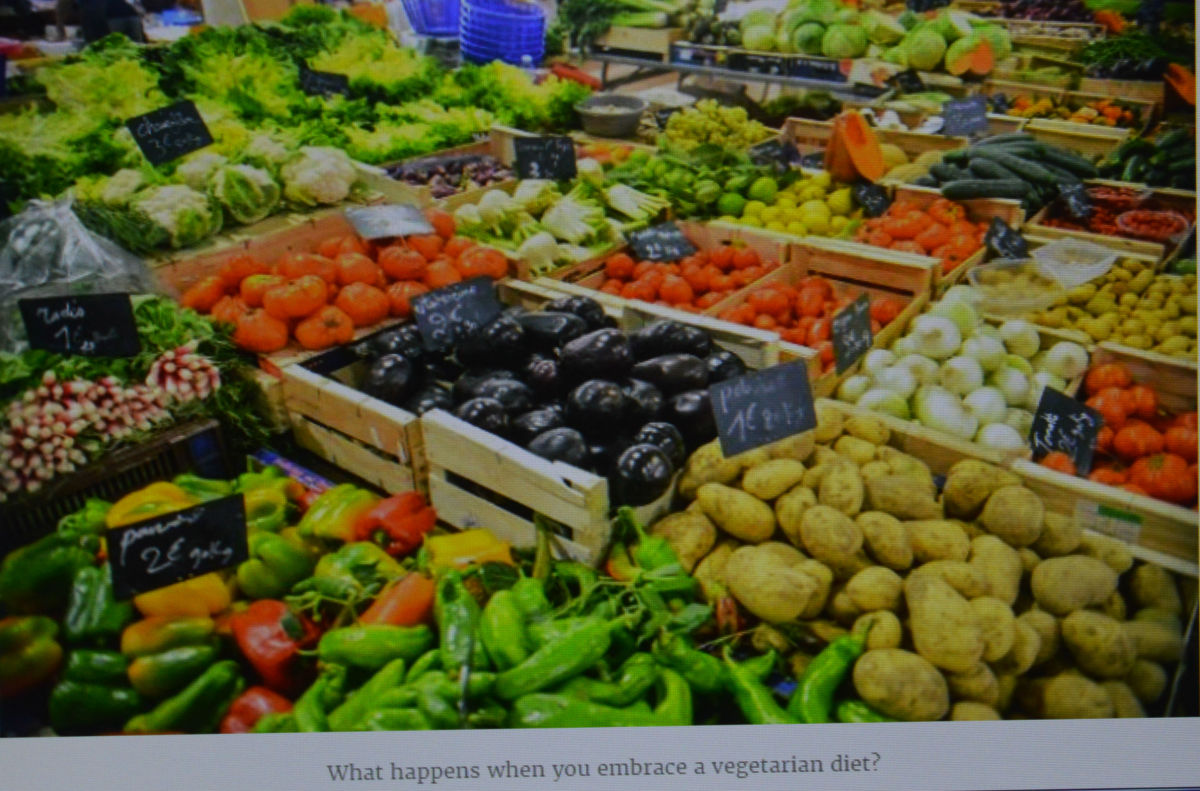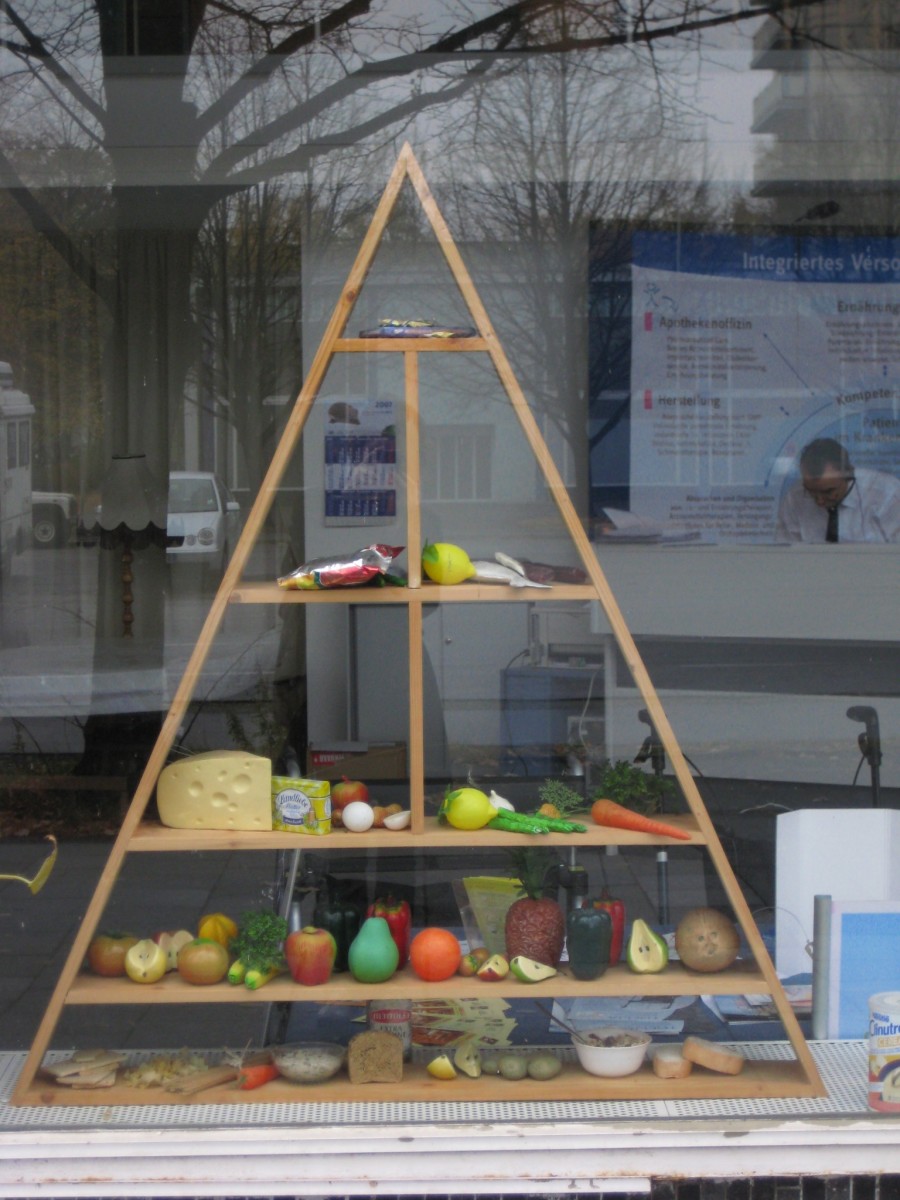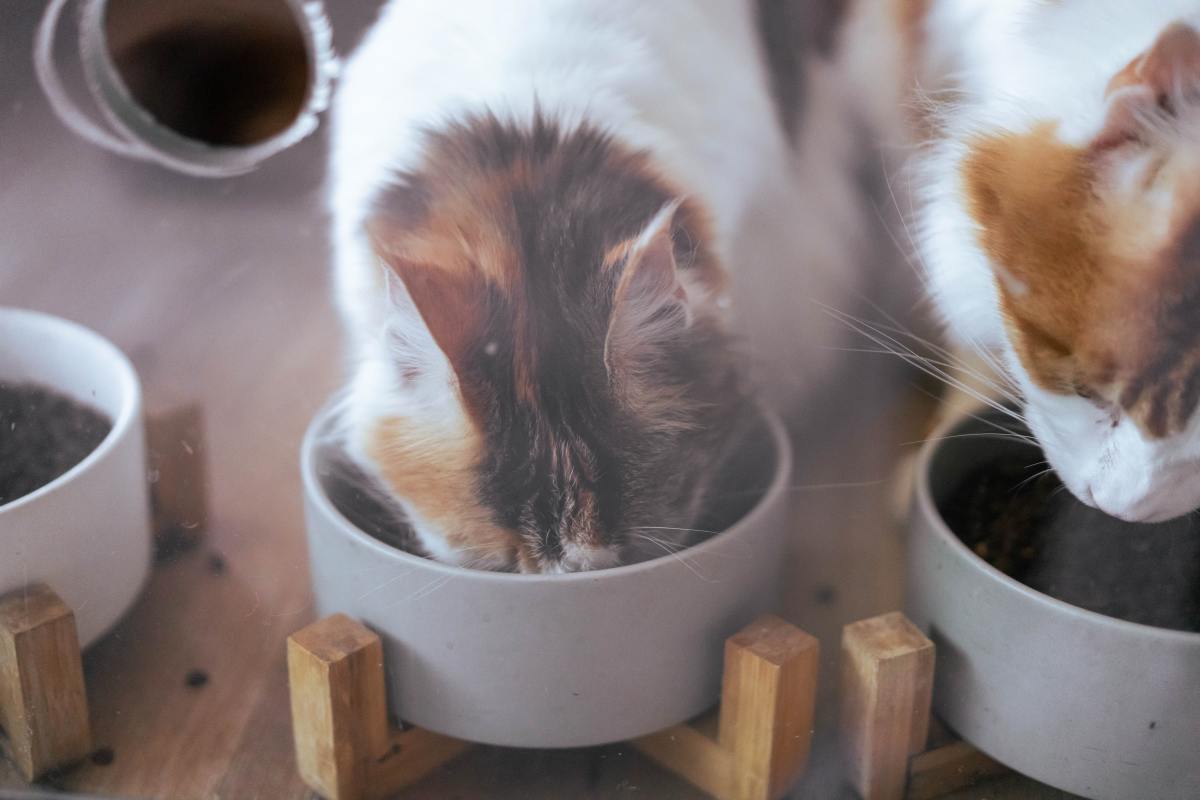My Journey to Vegetarianism
This is the first of two hubs outlining my journey from first becoming a vegetarian and then a vegan. The second part can be read here My Journey to Veganism.
When I was a kid...
It all started when I was a kid. Like everyone I was served up meat dishes, poultry, fish, dairy, eggs, honey... I ate these things because it was what my mother was taught to cook by her mother, and her mother by hers, and... I was no different to other children who eat these things because it's what their parents urge them to eat.
At the same time, I was acutely aware of the death of the animal on my plate. I remember crying over a fish, that was served to me with its eyes still in place. Parents on the whole shield their children from the truth, saying things such as 'You have to eat meat to live', or lies such as 'but the animal was treated well' (as if killing an animal that certainly does not want to die equates with treating them well...) This usually goes against a child's natural sense of fairness. It did mine.
On the whole children are served animal flesh so far removed from what it once was, there's really no realisation as to what it once was. Curiously, a school in the UK was reprimanded for taking school children to an abattoir as an educational trip. The kids were traumatised. One vomited on the premises.
It brought home the realisation that this animal died... for me, not for someone else – but for me. Someone had killed this animal, not for someone else in an abstract sense, but directly for...me!
I even remember a conversation with my mother or father, which was supposed to make me feel better about the whole thing, but in fact made me feel worse. It was along the lines of, 'this fish/chicken/sheep lived so that you could have something in your tummy.' These are not the exact words, but close enough. I found it astounding that this creature lived exclusively so that I should eat it – and didn't really believe it.
But the conversation also immediately generated a feeling within me where I was wondering, who am I to have an animal slaughtered for me?
It brought home the realisation that this animal died... for me, not for someone else – but for me. Someone had killed this animal, not for someone else in an abstract sense, but directly for...me!
It somehow didn't make sense. Especially when a lot of the time I wasn't even that hungry, but I was told to 'eat up.'
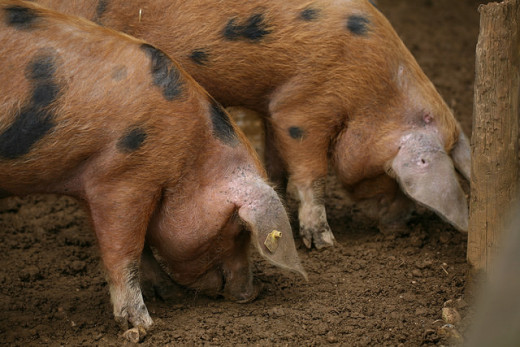
When I was an older kid - working on a pig farm
When I was a little bit older, I used to help my uncle on his pig farm during the summer holidays. I would go round the farm with him, help out where I could, pull levers if I could, all that kind of a thing. Also I used to help him push the pigs onto the truck ready for the slaughter house. I'd never seen any creatures fight so furiously for release and be filled with such terror. Piss and excrement would pour off the back of the truck. I felt bad helping them to their deaths.
But as ever, it was drilled in me that 'this is just the way creation works'. This is the circle of life argument, with humans as the top of the food chain. It was only later I learned enough about life to understand why such statements are pretty much meaningless, and used as an excuse to manage traditional behaviour. At the time though, I was unable to defend my inner sense against that kind of argumentation.
I didn't have the knowledge nor the tools to formulate or defend what I was feeling.
And he said: "Truly I tell you, unless you change and become like little children, you will never enter the kingdom of heaven. Matthew 18:3
Childhood and animal eating
In retrospect, I see more clearly the saddening ethical rupture which happens early on in life, to a point where a child forgets their innate sense of fairness. Once this has gone on for a while, and a taste for salts and sauces has developed, the way is set for meat eating.
Some parents will even say things like 'our Johnny loves his meat', when all Johnny is doing, is associating the taste of salt, sauces and sugar with satisfaction. The whole of creation works on sugar, so this is hardly surprising.
No meat tastes good without these things. Humans can't eat meat without doing a whole lot of things to it, to make it palatable. Most adults have a problem with chewing on a carcass full of hair, blood , guts, not to mention excrement. Human adults can't chew on bones unless they want to break their teeth.
The following video is a delightful example of how children think about other creatures, before the adult world steps in and teaches them otherwise. The understanding mother accepts her child's discomfort and goes with it. (A good example of a parent who hasn't been programmed into thinking that their child has to eat meat to be healthy).
- How We Teach Children a Separate Morality for Food Animals
In an eye-opening new research paper called The Conceptual Separation of Food and Animals in Childhood, University of Bristol researchers Kate Stewart and Matthew Cole explore how we, as a society, teach our children a separate morality for food anim
When I was a young adult - killing fish
Things begun to pick up in earnest when I worked in a restaurant and I had to scoop out fish from a fish tank that a customer might want. I had to catch a fish out of the tank with a net, get it into the deep sink, and do my best to kill it. That pretty much involved trying to whack it on the head, while it was slithering around, gasping, trying desperately to survive.
I was wondering, does the customer upstairs know what's going on down here? I was still eating meat at the time, but killing the fish put me in direct contact again with the process. I could have been kind to the fish, instead, I killed it. It's urge was to live, not die. Of course, it was my job, so I had to do it. But it opened up in my mind the whole process again.
How humans bully nature. How we eat things we don't even need to, which seems abusive and perverse. Purely killing an animal for entertainment purposes which is insane really.
It seemed to me fairly simple: If you don't need to kill a creature to live, don't do it.
Yet, it still wasn't enough for me to become vegetarian. In retrospect, I realise I was just hopelessly addicted to my habits and I feared change. Also, I didn't know anyone who was vegetarian. In my mind, I had a negative mental image of vegetarians and thought of them as somehow strange.
I was just young and stupid. I had unwittingly written off 42% of India's population – that is, 500 million vegetarians in India had been written off by me due to my ignorance and lack of knowledge.
I guess I was still just brainwashed. I still believed as well what the back of the milk van said: 'Milk for strong bones' - which was just an advert passing as accepted knowledge, and again science shows to be wrong (but that is the subject of my second hub, on veganism).
My last animal dish was... mackerel
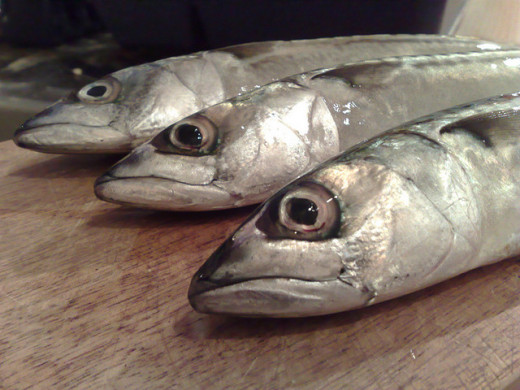
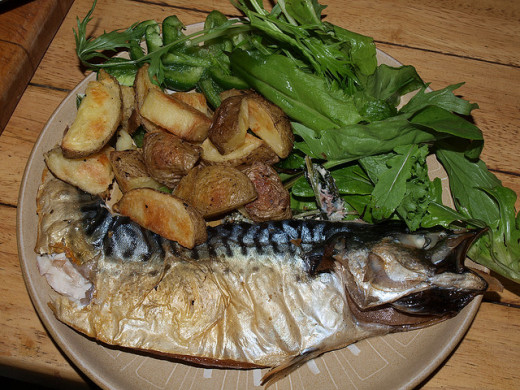
So when I finally became vegetarian...
I was about twenty one. It was when the 'mad cow disease' was hitting the headlines in the UK. Reading up on the way the cows were being bred, and the horrible things they were being given to eat (other cows crushed up, as well steroids and anti-biotics), finally made me realise I had to do something about the food I was eating.
It might seem like a selfish reason to have finally given up meat, but really, it came on top of the underlying feeling I'd always had about eating animals from my first hand experience on the farm.
I remember the last piece of meat (white meat) I had. It was a mackerel bought from the market in Worthing, UK. Being freshly fished, it should have tasted nice. I had even cooked the fish with almond flakes on it, and some lemon. But it tasted bad to me, and I'm pretty certain it wasn't the cooking...
My body seemed to be telling me, don't eat this stuff anymore. All those years of feeling uncomfortable with meat eating, had finally translated itself into me actually finding the taste of meat, fish and chicken, unpleasant.
And that was that.
I vaguely envisioned that I'd do a month without meat, but it soon became several. After a year, I considered myself vegetarian.
When I visited my mum and dad's home after becoming vegetarian, it was initially with a sense of awkwardness. My mother prepared meat-free meals, though at the time I think she felt I was going through some kind of fad.
It was just the awkwardness of early days though, and 25 years later, life is normal in that regard. Even my mother eats mostly vegetarian these days.
Of course, I didn't realise at the time that I'd be shifting to veganism much later on...
It's worth spending some time on describing in more detail the initial struggles I had becoming vegetarian. For anybody considering a change of diet, knowledge is usually power...
The fight through vegetarianism
Imagined health issues
Like many people who stop eating meat, I sometimes equated a health issue I might have, with the fact that I was not eating meat anymore. I've seen these kinds of conclusions a lot over the years. A change of diet is always going to take time to settle on a psychological level, and the body takes a while to change. The absence of meat, is not going to cause a sudden health issue. Issues from before may carry over, or even get worse temporarily as the body sheds some of its toxic load, but it's definitely not the lack of meat which is causing illness.
Emotional difficulties
There might be emotional difficulties to work through, such as an association of Christmas with a turkey. This might sound trivial, but Christmas and the Christmas meal is such a big landmark in people's minds. The idea of Christmas dinner without turkey might feel like something impossible. These issues can be worked through by focusing on not wanting to harm animals for the sake of entertainment.
People's opinions
There is so much tradition and nonsensical logic around the consumption of animals. So many people will look at you as strange or maybe weak, for not eating meat, despite the enormous health benefits from avoiding meatn (see my hub on the health benefits of not eating meat). Socially, I have to say it was a bit difficult at first.
Some will cite your 'sentimentality' on occasion – not realising that this process of being 'tough' and forgetting compassion, is a kind of right of passage in some sectors of society, as a child grows up (see the article link above, beneath the video). Notwithstanding the fact that health science now tells us that we're better off not eating meat at all...
Vegetarianism is sticking to all the good food, and removing the food that needs a lot of work to make it actually palatable
But what do you eat??!
That whole 'what do you eat?' argument and line of questioning also became a bit boring to be honest. It took me a long while to really not care what people thought, and not become caught up in really pointless lines of reasoning:
For example:
- But we have canines to eat meat don't we? - no we don't, look at lion canines and see the difference – we have grinding teeth like herbivores
- Plants have feelings too? - Perhaps they do, perhaps they don't - but if you can't see the difference between a chicken and a lettuce, good luck to you sir. And anyway, how does that even create less of a reason for vegetarianism?
- Where do you get your protein? - Everywhere! Protein is in everything, show me a protein deficient person...
- But I've seen anaemic vegetarians and vegans! - Yes, and I've seen anaemic meat eaters!!
- But chimpanzees eat meat. - They do, but we're more closly related to bonobos not chimps, and bonobos don't eat meat, they're fruit eaters.
- But Hitler was vegetarian! - No he wasn't. He dabbled with different diets. In no way could he be considered a proper vegetarian. A whole PR exercise was created around him as well, to try and replicate the success that Gandhi had (who was a true vegetarian).
And so on. I have been over these so many times...
Throughout all of this, initially what kept me vegetarian when things became a little trying, wasn't really because of the health benefits that eventually started to happen for me. It was because I didn't want an animal to die for me.
Why should it die for me, when I could have something else?
Later, when my tastes changed, I rejected meat foods also because I just didn't like it anymore.
With regards to people's criticisms, these days I say that everybody is vegetarian, which surprises some people in conversation. I point out that meat is unpalatable unless you cover your meat in sauces that are derived from... fruits and vegetables. That's always a funny one. So vegetarianism is actually sticking to all the good food, and removing the food that needs a lot of work to make it actually palatable.
A tasty looking veggie dish
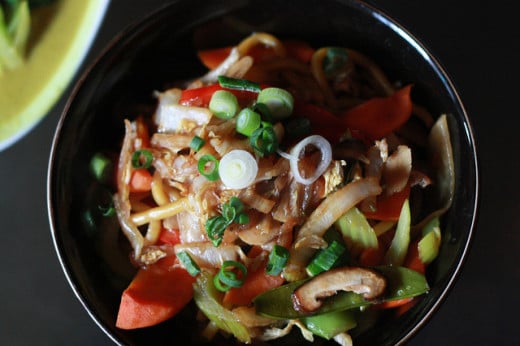
It's so simple
I found vegetarianism to actually be a very simple and cleaner way of life.
Dishes were much less greasy than before, food bills were cheaper. I felt healthier. Furthermore, whenever there was a meat scare in the news, it didn't affect me.
Obviously, going vegetarian doesn't mean someone is going to be magically healthy, especially if they're eating junk food, but seeing as I avoided as much as possible all the rubbish food-like substances anyway, removing meat definitely gave me an energy boost.
In my next hub, I explain my slow conversion to veganism...
Vegan? That word sounds like something from an alien movie... There's no doubt about it, the term Vegan is a pretty bad one...
Have a good day!
- Reasons to stop eating meat
Some very good scientific reasons why stopping the consumption of meat is beneficial to human health, and the planet as a whole. - The Intelligence and Sentience of Animals
Animals are far more cognizant than we give them credit for. Check out these amazing videos, including elephants that can paint pictures and the woman who communicates with a dangerous leopard!
Would you ever consider becoming a vegetarian?
© 2015 Electro-Denizen


